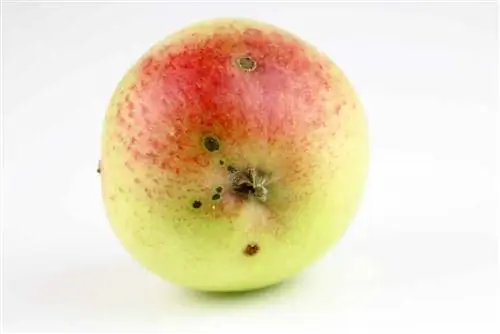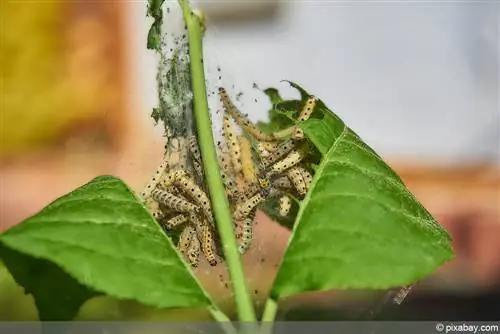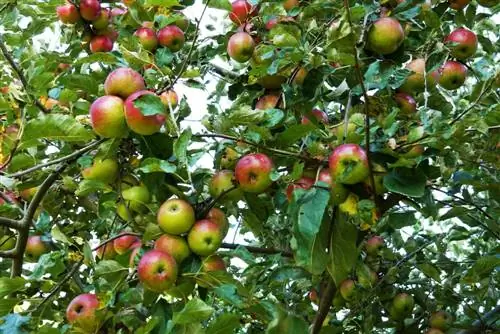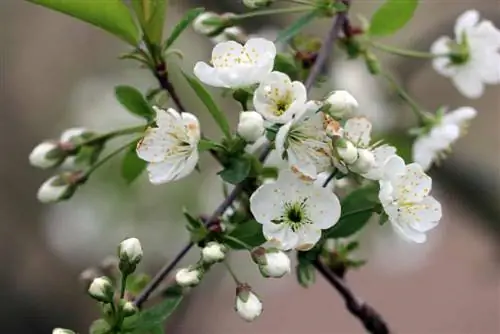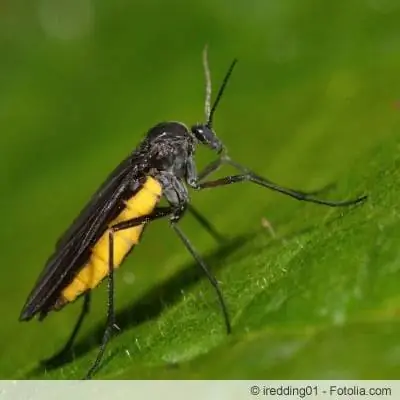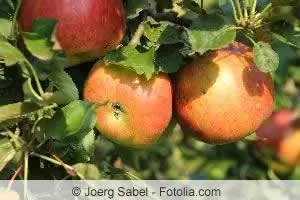- Author admin caroline@plants-knowledge.com.
- Public 2023-12-17 03:39.
- Last modified 2025-06-01 06:48.
Every year, tens of thousands of hobby gardeners and fruit growers struggle with apple scab infestation. The fungus is one of the most feared and widespread pests of apple trees. Practically all common apple varieties are affected. In order to be able to combat apple scab specifically and effectively, you usually can't avoid spraying - either with a sulfur solution or with fungicides.
Recognize
Venturia inaequalis, the scab fungus, can cause massive damage to apple trees. It is therefore very important to start combating it early. To do this, you first have to recognize an infestation on the tree. This is possible long before the fruits have formed. The focus is always on the leaves of the tree. If you show the following changes or symptoms, you are guaranteed to have a fungal infection:
- olive green spots on the leaf surface in the early stages
- at a later stage then brown spots that can take over the entire leaf
- bump-like twisted leaves in the event of a very severe infestation
- many dead leaves on the tree
Similar changes will later appear on the fruits. The peel of the apples can then very quickly take on a strange grain that is vaguely reminiscent of the appearance of cork. The individual spots eventually burst open and cracks form. It almost goes without saying that this not only results in visual impairments, but also causes massive damage to the fruits themselves. This is also why apple scab is considered by far the most dangerous threat to apple trees. Since an infestation is generally very likely, preventive action is recommended. In any case, you should take action as soon as you see even the slightest signs of apple scab on the tree.
Sulfur
The sulfur or net sulfur is still a proven means of preventing apple scab. It is harmless to most beneficial insects on the tree and poses no danger to bees in particular. However, at certain concentrations it can be harmful to ladybirds, predatory bugs or predatory mites.
Net sulfur is available from various manufacturers in garden shops. Typical products include Netz Sulfurite WG from Neudorff, Netzschwefel Stulln, Compo Mildew Free Kumulus WG or Netzschwefel Sufran Jet. The sulfur only kills the germ tubes of the fungus orits spores deposit on the leaf surfaces. This cannot combat a severe, acute infestation. In order to be able to distribute wetting sulfur on the tree with the garden sprayer, a solution must be mixed. This is how you proceed when using network sulfur:
- - spray once a week from the so-called mouse-ear stage of the leaves to flowering
- - Initial dosage: 70 g of wet sulfur to ten liters of water
- - reduce the sulfur content of the solution by ten grams weekly to avoid possible chemical burns on the trees
- - after flowering, continue spraying with a low dosage depending on the weather (20 to 30 g)
- - generally do not spray at temperatures below ten and above 28 degrees Celsius
- - never spray in strong sunlight
Note:
Some apple varieties do not tolerate the use of wet sulphur, or only tolerate it very poorly. These varieties include Golden Delicious, Cox Orange, Bräborn and Berlepsch. You have to use a fungicide straight away.
Fungicides
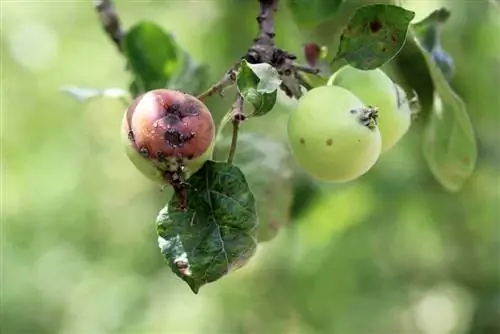
Fungicides are plant protection products that are specifically developed to combat fungal diseases. Most fungicides available in specialist stores also work against apple scab. In contrast to net sulfur, they not only kill the Kim tubes, but also the developed fungus. The exact application and, above all, the dosage depend on the respective product or the manufacturer's specifications. Widespread fungicides that are also frequently used by hobby gardeners are:
- Duaxo Universal fungus-free, which contains the active ingredient difenoconazole. In addition to combating apple scab, it can also be used to treat fungal infections on roses, ornamental shrubs, other fruit trees and even vegetables. On the one hand, the agent stops the further spread of the fungus and, on the other hand, has a preventive effect against new infestation.
- Mushroom-free Ectivio, which is based on the active ingredient mycolobutanil. It is particularly suitable for the targeted control of fungal diseases in pome fruit, but can also be used on wine and ornamental plants. The remedy has both a preventative and a healing effect.
- Universal Mushroom Free Baycot M, which also works with the active ingredient mycolobutanil. It is a contact and systemic agent with which, in addition to the immediate effect, a long-term effect can also be achieved. In other words: In addition to the immediate effect, it also offers a preventive function. It is suitable for pome fruit, ornamental plants, wine and also roses.
Fungicides must always be sprayed over large areas according to the manufacturer's specific instructions. The entire apple tree must be covered as best as possible. In particular, the crown of the tree should not be forgotten, even if it is usually difficult to reach. If in doubt, you have no choice but to climb up or into the tree using a ladder.
Preventive measures
The best fungal disease is of course the one that an apple tree doesn't get in the first place. Unfortunately, apple scab infestation can never be completely ruled out in this country. However, there are a few steps you can take to minimize the risk. It starts with choosing the apple variety. The varieties Alkmene, Elster and Melrose are far less susceptible to apple scab than most other noble apple varieties. Another measure is to immediately remove and destroy fallen leaves in autumn. The fungus forms winter spores and hibernates on and in the leaves. By the way: Infected leaves should not be put in the compost, but rather in the residual waste bin. A third, very effective measure is a strong cut of the crown. The aim must be to achieve the lightest possible crown structure.
Squirt
Many hobby gardeners have great concerns about the use of pesticides. Some of them vehemently resist spraying. The problem is that in the event of an acute apple scab infestation, there is no alternative if the tree is to be preserved permanently or bear fruit. Modern fungicides in particular are now far less dangerous for insects and other living creatures than was the case a decade or two ago. In addition, manufacturers today generally avoid adding copper, which has killed many other living beings. Anyone who has a severe fungal infection on their apple tree will have to bite the bullet and resort to a garden sprayer.

